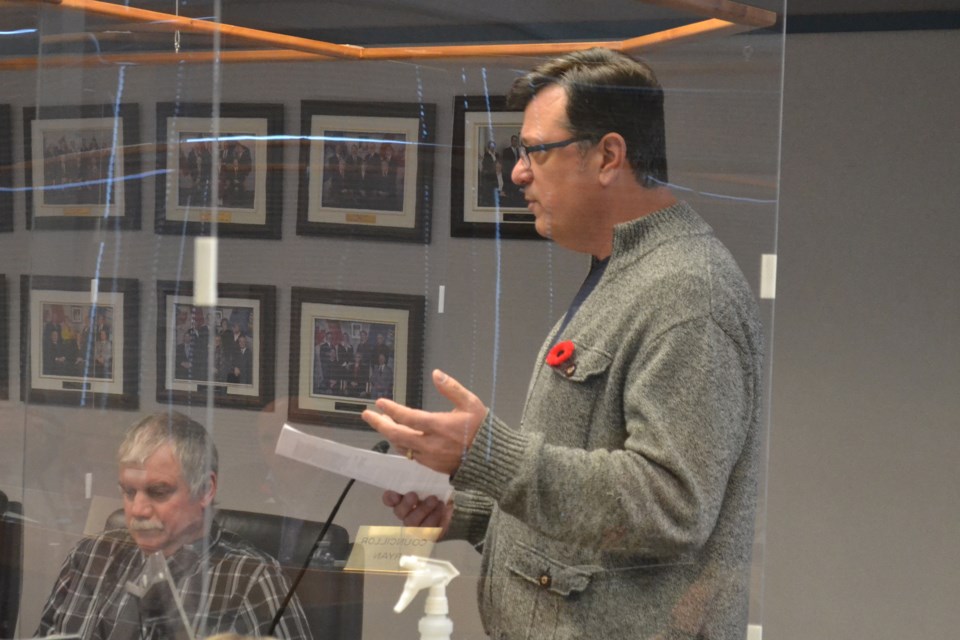OLDS — Councillors’ expense budgets have been “significantly over budget every year” for at least a few years, according to a spokesman for the town’s Ad Hoc Citizens Committee on Council Remuneration.
Councillors were very skeptical of that allegation when it was brought up during their Nov. 2 policies and priorities meeting.
Finance director Sheena Linderman was asked for her thoughts. She indicated she was doubtful that was the case, but would have to check into the matter, as she didn’t have the paperwork with her.
Linderman did say it seemed to her that councillors might have spent beyond their budget in 2019, but again, at that moment, she couldn’t say for sure.
After a 27-minute discussion, council voted to accept the committee’s report for information. It will be brought back for a decision on the recommendations later.
“We’ve reviewed the budget over the past several years,” said James Cummings who was appointed to the committee along with Phyllis Horpenuk, Leon Muir and Dan Peters.
“The budget didn’t seem to be a concern to the expenses that were being claimed by council in that they were significantly over budget every year. As an accounting student myself, I find that kind of odd," Cummings added.
“The budget is still put on the same amount every year, but it doesn’t seem to matter too much.”
Currently, councillors receive a monthly honorarium in compensation for their duties.
As of Nov. 1, 2017, those rates were set at $2,820.57 for the mayor and $1,543.79 for each of the six councillors.
Those honoraria are tied to the consumer price index and are reviewed annually to see if they need to be increased accordingly.
Councillors also receive per diem (Latin for per day) payments for their time and expenses.
The committee initially submitted its report a while ago, but during that presentation, councillors expressed concern they weren’t consulted, so the committee went back and met with them.
Councillors indicated to the committee that current remuneration doesn’t appear to cover the time they spend preparing for meetings or other events and activities.
Cummings acknowledged that concern but expressed reservations about how that prep time would be calculated.
“There’s no way to control what prep time is, right," Cummings said.
“So you can say ‘I spent 10 hours to prep for that one-hour meeting’ and the claim process would go through. Without a check or a balance in that, you’d literally open the door to claim whatever you want.”
Nonetheless, Cummings noted the committee had recommended a change to the town’s policy that will allow for “adequate preparation time.”
Several councillors pushed back against the idea they’ve ever gone over budget.
“I'm not sure if there was a miscommunication,” Coun. Mary Anne Overwater said.
"To me, he sort of indicated that we had gone over our budget for the last few years, which I find that difficult to believe.
"So I think going forward, at our next meeting, possibly Ms. Linderman will have some more information for us so that we can get that clarity that we need so that all of our residents don’t feel that we’re just out there spending willy nilly and putting down on our budgets whatever we think and yet it’s just getting passed, because that doesn’t happen,” she added.
“If we’re over budget, usually our CFO (chief financial officer) or director of finance goes to the mayor and says ‘you guys can’t do that because you’re going to go over budget.’”
Overwater did agree that one councillor’s prep time may be different from another’s, thereby making it difficult to calculate that.
The committee also recommended that expenses be broken down by individual councillor instead of the current practice of lumping all their expenses together in one sum.
It also recommended that spending be reported monthly rather than annually as is the case now.
“We gave a couple of examples of that in our report of other towns and municipalities that do that and have it displayed quarterly throughout their web page, the websites," Cummings said.
“That’s obviously for the citizenry to see how that money is being spent.
Some councillors, like Heather Ryan and Mary Jane Harper, said they’d be fine with reporting expenses monthly. Others, like Overwater, didn’t like that idea.
“I believe the final total at the end of the year is the most important total. It’s reported in the financial statements,” she said.
“It’s very clearly stated as to what a councillor or mayor has collected throughout the year for their job that they’re doing.
“So I don’t really feel that it’s necessary that it needs to be posted monthly or quarterly.”
Currently, the mayor approves expense claims for councillors and the deputy mayor does the same for the mayor’s expense claims.
In order to avoid a situation in which expenses are approved through “an individual’s judgment alone,” the committee recommended that “a clear and precise” policy on that matter be worked out between council and chief administrative officer Michael Merritt.
Council was expected to further discuss council remuneration during its Nov. 9 regular meeting.



